Legal Q&A: Yes, Carlos can sue for defamation – but he is unlikely to win the case
A partner at Field Fisher Waterhouse and a specialist in dispute resolution, Colin Gibson discusses the legal framework of Carlos Tevez's threat to sue Roberto Mancini for comments the Manchester City manager made about the Argentinian striker in the aftermath of his apparent refusal to appear as a substitute during last month's 2-0 Champions League defeat at Bayern Munich

Your support helps us to tell the story
From reproductive rights to climate change to Big Tech, The Independent is on the ground when the story is developing. Whether it's investigating the financials of Elon Musk's pro-Trump PAC or producing our latest documentary, 'The A Word', which shines a light on the American women fighting for reproductive rights, we know how important it is to parse out the facts from the messaging.
At such a critical moment in US history, we need reporters on the ground. Your donation allows us to keep sending journalists to speak to both sides of the story.
The Independent is trusted by Americans across the entire political spectrum. And unlike many other quality news outlets, we choose not to lock Americans out of our reporting and analysis with paywalls. We believe quality journalism should be available to everyone, paid for by those who can afford it.
Your support makes all the difference.Q. Could Carlos Tevez sue Roberto Mancini for defamation?
A. Yes. Defamation, legally, is defined as lowering someone in the estimation of right-thinking people. Mancini went in front of a television camera and said that Tevez, a man who plays football for a living, had refused to play football. That is an allegation that does damage to his professional reputation. Technically, Mancini was speaking, so it would seem to be a case of slander, but as he was speaking into a television camera, he could be said to have participated in the broader publication in permanent form of his allegations, which is libel.
Q. What is the crux of his case?
A. Tevez seems to accept that he refused to warm up when asked to do so by Mancini in Munich, yet Mancini went on television and said he had refused to play. The case would rest on the interpretation of those two meanings. If a judge accepted Mancini's version of events, that Tevez's refusal to warm up was a de facto refusal to play, then it is very hard to see Tevez being able to make a case. If that "higher" meaning was not accepted, then there is something to argue about.
Q. What must Tevez prove if he is to win?
A. The curiosity of the libel laws in Britain is that, to the horror of Americans, the burden of proof lies with the defendant. It is not that Tevez must prove Mancini defamed him; rather, the Manchester City manager must prove he did not.
Q. What is the process now?
A. The limitation on cases like this is one year, so Tevez has plenty of time, though any delay may damage his credibility. There would be an exchange of letters between lawyers and, if he decided to proceed, Tevez would most likely issue a claim of both slander and libel. There may then be an early hearing to establish meaning – whether Mancini's assessment that refusing to warm up is refusing to play is correct – and then, if not, disclosure of documents and the gathering of witness statements before going to trial.
Q. Would Tevez win?
A. I do not think so. There is a very good argument for Mancini's version of events, while he may also have an admittedly thin defence of qualified privilege, that he was contractually bound to speak and that he was talking to a group of people who had an interest in the information beyond prurience.
Q. What would the ramifications for football be were he to do so?
A. Managers, who are under contract to speak, would have to be much more careful about what they said about their own players, opponents and referees. It may even force the Football Association, Premier League or Uefa to enshrine laws in contracts that players will not follow Tevez's lead if they are criticised by their managers.
They fought the law... and sometimes won
Tuncay Sanli After leaving Teesside for Fenerbahce, the Turkish international sued Middlesbrough for £544,677. He claimed the money was not paid to him for sporting, economic or image rights. He won the case.
Marco Branca Middlesbrough cancelled the Brazilian's contract after two specialists said his knee ligament damage would stop him from returning to football. Branca sued Boro for £500,000 for loss of earnings after he resumed his career with Italian Serie B side Monza. He won the case.
Brian Welsh The former Hibs player pocketed a "substantial sum" in 2008 after claiming an injection from a club doctor ruined his career. He sued Dr Malcolm Morrison for £350,000 at Edinburgh's Court of Session. Both sides settled out of court.
Sheffield United United sued West Ham after being relegated in 2007 by Carlos Tevez's goals: there were problems with the Argentine's registration. The Blades settled out of court for about £20m.
Paul Elliott The former Chelsea defender sustained a serious knee injury, resulting from a challenge by Liverpool's Dean Saunders. He never played again but filed a lawsuit against Saunders seeking damages for the injury. He lost the case as a civil court said Saunders was not at fault.
Keith Larke Larke demanded back the £11,942 he had paid for an executive box at Norwich because of an apparent broken promise by management not to sell Craig Bellamy.
Charlie Rheinberg and Rishi Ghosh-Curling
Join our commenting forum
Join thought-provoking conversations, follow other Independent readers and see their replies
Comments